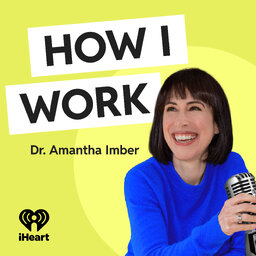Work-Life Fusion: Is it a problem if your career becomes your identity?
When asked to describe yourself, is one of the first things you mention your job? Why do so many of us form such a strong connection between our identity and our work? And more importantly, is that actually healthy?
To explore the complex relationship between self-identity and work, I'm joined by my good friend Sabina Read for another thought-provoking conversation.
Sabina is a clinical psychologist who shares her expertise weekly on 3AW and through her popular podcast "Human Cogs."
In this episode, we dive into crucial questions about work identity:
- How to tell if your job is consuming too much of your sense of self
- Practical strategies to create healthy boundaries between work and identity
- If having a personally aligned career can lead to a lack of balance
- How to identify if you are letting your vocation swallow your sense of self
- 1 simple step you can take to make sure your job doesn’t define you entirely
I found Sabina's positive take on work-identity integration particularly fascinating, as it offers a counterpoint to concerns I've personally wrestled with. Whether you're deeply aligned with your career or seeking more separation between who you are and what you do, this conversation offers valuable insights for navigating your relationship with work.
Key Quotes:
“I don’t know where Sabina starts and psychologist ends.”
“If you’re doing that kind of work and your energy feels depleted. I don’t know if I call that identity alignment with your job. I call that work-aholic.”
Connect with Sabina via her website, instagram, or check out her podcast Human Cogs.
My latest book The Health Habit is out now. You can order a copy here: https://www.amantha.com/the-health-habit/
Connect with me on the socials: Linkedin (https://www.linkedin.com/in/amanthaimber)
Instagram (https://www.instagram.com/amanthai)
If you are looking for more tips to improve the way you work and live, I write a weekly newsletter where I share practical and simple to apply tips to improve your life. You can sign up for that at https://amantha-imber.ck.page/subscribe
Visit https://www.amantha.com/podcast for full show notes from all episodes.
Get in touch at amantha@inventium.com.au
Credits:
Host: Amantha Imber
Sound Engineer: The Podcast Butler
In 1 playlist(s)
How I Work
You know those annoyingly successful people who seem to have it all figured out? Time to steal their…Social links
Follow podcast
Recent clips

BEST OF: I burnt out completely last year. This is how I recovered.
27:41

BEST OF: The People-Pleasing Trap: How Laura Henshaw escaped it (and how you can too)
35:19

BEST OF: Sahil Bloom on building a scoreboard that reflects what matters
37:07
 How I Work
How I Work